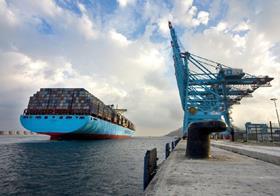
Shipping giant Maersk Line has revealed improvements to its network between Asia and North Europe, the world’s largest trade lane.
According to the group, the adjusted network will offer a more reliable product and enhance transit times in key corridors, while delivering operational cost savings.
Maersk Line will eliminate overlapping port pairs in order to reduce the number of direct port calls in the network. This enables increased reliability through slower network speeds while the reduction in port calls make it possible for Maersk Line to maintain competitive transit times.
Most significantly Maersk Line strengthens its products into Germany and the Netherlands, featuring market-leading transit times from main Asian markets to Bremerhaven and Rotterdam, where westbound transit times are improved by as much as four days.
Eastbound transit time between Rotterdam and Shanghai is reduced by five days, providing what Maersk Line called a 'unique product in the market'.
A key enabler for the improvements is Maersk Line’s more effective deployment of large container vessels across its five Asia – North Europe services in the network.
“We are utilising our scale to deliver a better product,' said Vincent Clerc, chief commercial officer at Maersk Line. 'With the largest network and the deployment of an increasingly uniform fleet of ultra large container vessels, we maintain our extensive direct coverage while focusing each service towards best in class transit times to specific markets on the trade.“
Maersk Line said it had drawn on experience from the first year of operations of the 2M alliance when adjusting the network.
Launched in the beginning of 2015, the ten-year agreement with MSC is the only global alliance not affected by the current shake up among global container shipping alliances.
“Our improved network is the result of a stable, maturing alliance seeking to address current customer-felt pain points. It strengthens our commercial offering and offers shippers a stable choice in times where other alliance networks await reshuffling,” said Clerc.
The improvements to the network are anticipated to be fully phased in during the third quarter of 2016.



